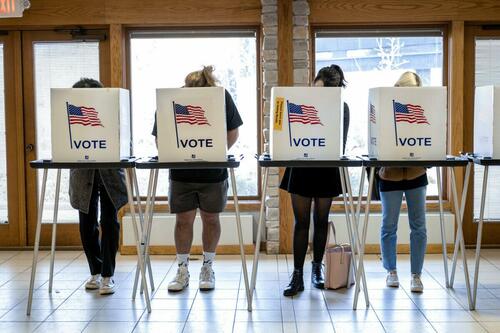CPA Group Wants States To Secure Elections Using Accounting Techniques
Authored by Beth Brelje via The Epoch Times (emphasis ours),
A small, loose-knit group of certified public accountants (CPA) hopes to convince states to apply the same methods that accountants use to assure integrity in business to bolster voter confidence in elections.

“What we want to do is make sure that eligible voters can find it very easy to vote, and people who are not eligible to vote can’t,” retired Marine Reserve Col. Frank Ryan told The Epoch Times. “Then, we want to make sure that every vote that is cast is counted.”
Ryan, a CPA, is a retired state representative in the Pennsylvania House. He left the seat in December, specifically to work on election security, believing he could have a bigger effect on public policy outside the legislature than from within.
It isn’t the first time that he’s been involved in election security. In 2005, when Iraq held its first free election in years to choose an entirely new National Assembly, Ryan facilitated the country’s election. That year, Iraqi voters stuck their fingers in dye so no one could vote twice.
More Than Math
While many think of CPAs as the arithmetic wizards who handle tax returns, Art Werner of the Philadelphia firm Werner-Rocca Seminars, which trains CPAs, says they do more than math. The CPA code of ethics and the work they do make CPAs the perfect profession to add oversight to elections.
They also set up systems to show how to avoid fraud and can forensically determine if there’s been fraud or mismanagement.
“The main function of a CPA is to do two things: one, to tell people what happened in the past,” Werner told The Epoch Times. “To do so, they design systems that can be reviewed in a manner that can guarantee that they are impartial and can guarantee that the results are proper, which allows, for example, banks to have confidence in financial statements that a CPA prepares.”
For example, when banks loan money, they rely on the CPA reports, balance sheets, and income statements prepared by CPAs to determine the health of a company.
“The CPA can design internal systems well beyond this financial structure that do the same thing. Can they design a system of internal controls so that people could redeem trust in elections? The answer is, a CPA can easily do that,” he said.
Adding CPA systems to elections in every state would increase much-needed trust, Werner said.
“Even if every state right now has a system that is working, if the people of the United States have a suspicion that there’s a problem, it lends to the fact that people will then walk away and say that we have an unfair election,” he said. “Maybe the CPA, by their involvement, can establish a system that will say [that] we have set up something that guarantees that it’s fair.
“Even if it turns out the results are the same, people will trust it.”
Inaccurate Voter Records
The Pennsylvania Auditor General’s damning 2019 performance audit of the Statewide Uniform Registry Electors (SURE) system, which is administered by the Department of State, caught Ryan’s attention when it was released.
“We identified tens of thousands of potential duplicate and inaccurate voter records, as well as voter records for nearly three thousand potentially deceased voters that had not been removed from SURE,” the audit stated. “We found that voter record information was inaccurate due to weaknesses in the voter registration application process and the maintenance of voter records in SURE.
“Specifically, voter registration applications remain in pending status for long periods of time—indefinitely in some cases, and although list maintenance activities are performed by counties, insufficient analysis and monitoring has resulted in inaccurate data in the voter records.”
Ryan said he was shocked by the report, which was written by a Democrat auditor general, Eugene DePasquale, to a Democrat-led administration.
“We are very discouraged by management’s response to our draft findings,” the report reads. “We were quite surprised that the DOS’ [Department of State’s] response indicates that it strongly disagrees with many of our findings and mischaracterizes information that was provided, or not provided to us in many instances, during the course of our audit.
https://ift.tt/fiqRNOL
from ZeroHedge News https://ift.tt/fiqRNOL
via IFTTT




0 comments
Post a Comment